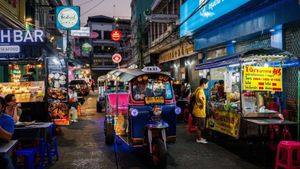The parish of Santa María Torres Acosta hosted a significant event this past Sunday, marking the introduction of the first and only relics of the Blessed Ulma Family to Spain. The ceremony reflected deep emotions and community spirit, with the mass co-celebrated by priests including Fr. Adam Zaremba, Fr. Adam Turek, and O. Professor Marek Raczkiewicz CSsR, who oversee the Polish community around this parish.
The processional ceremony commenced with children dressed for First Communion leading the way, followed by eight altar servers and representatives from the reenactment group "Poland First to Fight.” Amongst the procession, parishioners carried the image of the Blessed Ulma Family, signaling the event's importance as they made their way to the specially prepared pedestal adorned with white and red bouquets.
Upon completion of the procession, the mass began with the choir, Zespół "Krakus," performing the hymn "Panie Dobry jak Chleb." The central focus of the Eucharist was the heartfelt homily delivered by Fr. Sebastian, who serves at the parish located in Markowa, the historical site of the Ulma family's tragic martyrdom during World War II.
During his sermon, Fr. Sebastian moved many attendees to tears, recounting the horrors faced by the Ulma family. His words painted vivid images of the past, making the congregation feel as though they were witnesses to those devastating events. The choir added to the emotional ambiance with two poignant songs: "Szczęśliwa Rodzino z Markowej" and "Hymn Rodziny Ulmów.”
A special surprise during the mass was the recitation of a poem by parishioner Anna Fryc, written explicitly for the occasion. The verses moved the attendees, recounting the Ulma family's compassion and bravery in the face of adversity, emphasizing their spirit of mutual support and love.
The poem highlighted the unity of the Polish community with the Jewish population during the war, stating:
"Aż przyszedł czas strasznej wojny, Gestapo wyrok wydało, By zniszczyć nację żydowską, Mordować, kogo się dało."
Fr. Sebastian's poem not only serves as a remembrance of how the family sheltered persecuted Jewish individuals, but it also acted as testimony to the sacrifices made for the sake of humanity. It culminated with the recollection of the night of their betrayal, demonstrating the sheer horror residents endured:
"Gdy światło w chacie płonęło Jak lampka w nocy złowieszczej, Męczeńską śmiercią zginęli: Józef, Wiktoria i dzieci.”
The mass concluded with the community blessing the relics as they leaned down to kiss them, solidifying their deep respect and veneration for the Ulma family's sacrifice. The ceremony was not just commemorative; it acted as a reminder of the binding ties within community and the enduring impact of love and sacrifice on collective memory.
The concluding performance featured the children of the parish singing "Jesteś Bogiem," alongside Fr. Sebastian, and the whole event embraced both the sadness of loss and the joy of communal faith. Fostering communal bonds through the legacy of the Ulma family, this celebration strengthens the significance of remembrance and respect for those sacrificing for the greater good.
Such events highlight the resilience of Polish heritage, faith, and community and serve as reminders of past hardships and triumphs, fostering remembrance for generations to come. The Ulma family remains an embodiment of selflessness and the fight against oppression.



